You already know that the Arkansas Golden Falcons are closing in on the single-season wins record. But Did You Know? what other records could fall this season?
With a 109-39 mark, the Golden Falcons could break a five-year-old record for most wins in a season by winning 10 of their final 14 games. The Vancouver Iron Fist set the record in 1997, by going 118-44. Arkansas already set one record this season by going 63-17 at home, with one game remaining; the '97 Iron Fist had held that record also, with a 58-23 home mark. One bit of consolation for the '97 Fisters: Their 60-21 road mark is safe, as the Falcons are 46-22 with 13 road games to play.
Most of the league's other team records don't even a remote chance of being challenged over the last two weeks of the season. The only ones worth watching: The Golden Falcons need 5 more shutouts to tie the '98 Iron Fist's record of 18; and the Newark Sugar Bears need to sock 41 home runs in their final 14 games to tie the league record of 305, which Newark set two years ago.
Most Valuable Barry?
By the end of this season, Arkansas's Barry Bonds may have rewritten the record book. The 39-year-old slugger seems assured of pulling off two feats for the first time this year: Winning the traditional Triple Crown (batting average, home runs and runs batted in) and the so-called Sabermetric Triple Crown (batting average, slugging percentage and on-base percentage). No player has ever done either.
Bonds is hitting .352 (151-429); his closet rivals are Stanhope's Bernie Williams (.331) and Philly's Albert Pujols (.320). That's actually the closest race in the sabermetric standings; Bonds has a huge lead in on-base percentage (.524) and slugging percentage (.909) over Honolulu's Jason Giambi, his closest pursuer in both categories (.438, .650). Bonds has 159 RBIs, 30 more than Vancouver's Sammy Sosa, and 68 home runs, 18 more than three players tied in second place. To catch Bonds, it would take a record-setting hot streak from one of these guys, as well as a dismal season-ending slump from Sir Barry. It doesn't seem likely.
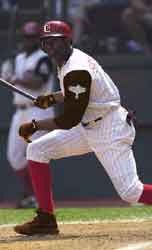 That alone should give Bonds another mark that's
eluded him -- his first ever Kevin Mitchell Most
Valuable Batter Award -- but he's not done yet.
That alone should give Bonds another mark that's
eluded him -- his first ever Kevin Mitchell Most
Valuable Batter Award -- but he's not done yet.
Bonds's .909 slugging percentage is assured to be a league record, currently held by Ryan Klesko, who slugged .757 as a rookie with Newark in 1996. Bonds would have to go 0-for-87 to drop his slugging percentage to .756.
Bonds's on-base percentage of .524 will likely be a record as well -- to not eclipse Gary Sheffield's .485 on-base percentage, set with Louisiana in 1997, Bonds would have to go 0-for-48.
That said, Bonds's 1.433 on-base plus slugging percentage is almost certainly going to break the current record, 1.221 set by Klesko in '96.
It's almost impossible for Bonds to break Deion Sanders's record batting average of .384, set with Cheyenne in 1993, during the Microleague era. But he could break the modern (Diamond Mind Baseball) era record of .365, set in 1998 by Arkansas's Frank Thomas, to do so, he'd need to hit over .500 over his remaining 14 games.
With 68 home runs, Bonds will likely break Sosa's DMB record of 73, set with Vancouver in '99. Bonds is on a pace to hit 75 long balls this season, which means Mark McGwire's all-time mark of 84, set in 1996, appears out of reach.
Bonds would have to turn it up a notch to claim the modern record for RBIs, needing 23 to break Sosa's mark of 181 in 1999 -- he's on pace for "only" 176. Klesko's all-time record of 225 in '96 is safe.
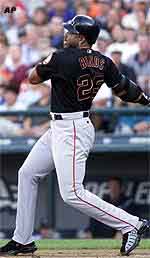 Oh, and just in case he needs a couple more plaques on
his wall: Bonds is on pace to draw 179 walks, which
would break McGwire's record of 176 in 1996; and on
track to score 164 runs, which would edge out Chuck
Knoblauch's record of 163 (set with Arkansas in
1997). However, it should be noted that runs scored
totals are not available from the first few years of
the league.
Oh, and just in case he needs a couple more plaques on
his wall: Bonds is on pace to draw 179 walks, which
would break McGwire's record of 176 in 1996; and on
track to score 164 runs, which would edge out Chuck
Knoblauch's record of 163 (set with Arkansas in
1997). However, it should be noted that runs scored
totals are not available from the first few years of
the league.
Batting Records By Guys Not Named Bonds
Juan Uribe has already set the DMB record for most triples in a season, with 19. Toledo's Lance Johnson hit 17 triples in 1997. Actually Newark's Mark McLemore (16 triples) and Columbia's Cristian Guzman (15) still have a shot to catch Uribe and claim the record for themselves. Of course, nobody will ever touch the all-time record of 62 -- that's right, 62 triples -- hit by Sanders in 1993.
Phoenix's Ichiro Suzuki needs 31 hits in his final 14 games to tie Jim Eisenreich's DMB record, set in 1997, of 238. Ichiro's current pace would leave him 10 hits short. No one will ever touch the all-time record of 295 hits in a season, set by Neon Deion in his crazy '93 season.
Honolulu's Giambi needs 9 doubles in his final 14 games to tie Terry Shumpert's record of 69 two-baggers, set two years ago. He's on a pace to smack 66.
Pitching Records
Columbia rookie Mark Buehrle leads the league with a 2.33 ERA, but he'd have to throw five straight shutouts to close out the season with an ERA better than Sid Fernandez's 1.90 mark (minimum 150 innings pitched), set with Sacramento and Austin in 1994. Buehrle likely will only have three more starts this season anyway. But he might be able to edge past the DMB record of 2.31, set by Derek Lowe with Austin two years ago.
Buehrle has a better chance -- but still not a very good one -- of breaking Pedro Martinez's record for lowest WHIP (150+ IP) of 0.859, set with Arkansas last year. Buehrle is this year's league leader, with a 0.953 WHIP. Another rookie, Hoboken's Joel Pineiro, is the league leader in hits per 9 (7.0), but he can't catch Austin's Nolan Ryan, who averaged 6.1 hits per 9 in '92. But it's more likely that Vancouver's Greg Maddux, who averages 1.0 walks per 9 innings, could slip past Arkansas's Bob Tewksbury (0.8 BB/9 in 1993). Randy Johnson, with a league-best 12.0 strikeouts per 9 innings, would need a phenomenal couple games to break his own record of 12.9 K/9, set in 1996.
The league's wins record of 26, set by Maddux with Vancouver in 1998, is safe. Arkansas's Pedro Martinez and Hoboken's Pineiro each have 19 wins.
However, Martinez could snap a two-year-old record for winning percentage (minimum, 15 decisions). He's 19-2 (.905) and likely to get only one more start this season; if he wins or gets a no-decision, he'll break Mariano Rivera's record of 14-2 (.875), set with Jerusalem in 2000. Even if he loses that game, he'll set the record for best winning percentage with a minimum of 20 decisions, currently held by Austin's Jose Rijo, who went 18-3 (.857) in 1992.
Wanaque's Antonio Alfonseca (10-1) and Brooklyn's Vladimir Nunez (10-5) would have to come up with 6 wins in the last two weeks of the season to tie Jeff Zimmerman's record of 16 relief wins, set with Vancouver in 2000.
Harrison's Wade Miller has an outside chance of tying a dubious record: He's three losses shy of the all-time record for failure held by Waikiki's Chris Bosio and Charlotte's Rick Sutcliffe, who each lost 21 games in 1993. It's unlikely that Miller will appear in three more games this season, however, so the record will stand another year.
The saves record likely is safe as well. Vancouver's Billy Wagner had 41 in 2000; Rivera and Phoenix's Troy Percival are currently tied for the league lead with 31. The record for blown saves -- 15 by Harrison's Derek Lowe last season -- is probably safe as well, with Honolulu's Ugueth Urbina leading the league with 9.
Percival leads the league in relief points (Wins + Saves x 2, minus Losses + Blown Saves), with 63 (4-2, 31 SV, 5 BSV). Rivera has 60 (5-7, 31 SV, 5 BSV) and Wagner 55 (5-5, 28 SV, 6 BSV). There probably won't be enough save opportunities left this season for anyone to challenge Wagner's league record of 86 (6-4, 41 SV, 4 BSV), which he also set during the 2000 campaign.
Now that the trading deadline has come and gone, Did You Know how many trades were made this year?
There were 21 trades made during the 2002 season, involving 21 picks and 40 players. This year ranked fourth in total trades, third in total players and tied for fourth in most picks. It was third in players plus picks (61).
It was the most trades in a season since 1999, which remains the all-time leader with 33 trades involving 83 players and 38 picks.
| Year | # trades | # players | # picks | players + picks |
| 1991 | 2 | 6 | 0 | 6 |
| 1992 | 12 | 27 | 12 | 39 |
| 1993 | 23 | 30 | 25 | 55 |
| 1994 | 12 | 24 | 14 | 38 |
| 1996 | 8 | 25 | 5 | 30 |
| 1997 | 8 | 23 | 7 | 30 |
| 1998 | 26 | 72 | 32 | 104 |
| 1999 | 33 | 83 | 38 | 121 |
| 2000 | 17 | 38 | 21 | 59 |
| 2001 | 12 | 29 | 13 | 42 |
| 2002 | 21 | 40 | 21 | 61 |
More Did You Know?
Eight trades were made before Draft Day, one during Spring Training and 12 during the regular season.
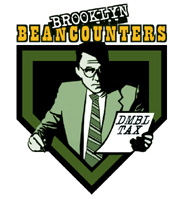 The Brooklyn Bean Counters made the most
trades, with seven. The Newark Sugar Bears made
six trades, and the Stanhope Mighty Men and
Vancouver Iron Fist made five. The Hoboken
Cutters, Philadelphia Endzone Animals and
Phoenix Dragons made four trades, followed by
the Carolina Mudcats with three trades and the
Tijuana Banditos with two. The Harrison
Rats and Honolulu Sharks each made one
trade.
The Brooklyn Bean Counters made the most
trades, with seven. The Newark Sugar Bears made
six trades, and the Stanhope Mighty Men and
Vancouver Iron Fist made five. The Hoboken
Cutters, Philadelphia Endzone Animals and
Phoenix Dragons made four trades, followed by
the Carolina Mudcats with three trades and the
Tijuana Banditos with two. The Harrison
Rats and Honolulu Sharks each made one
trade.
In their seven trades, the Bean Counters gave up six draft picks (two in the 2002 draft) and four players, and got back six draft picks (two 2002 picks) and eight players, swapping a total of 24 players and picks. Brooklyn picks eight times in the first five rounds of the 2003 draft.
Only three teams -- the Arkansas Golden Falcons, Columbia Rattlesnakes and Wanaque Wolverines -- didn't make any trades this year.
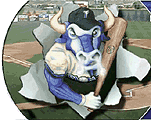 It was the third straight year that the Wanaque
franchise (known as the Vatican City Cardinals
in 2001 and the Hillsborough Destroyers,
1998-2000) stood pat. The last time this franchise
made a trade was April 26, 1999 -- Francisco
Cordova to Carolina for Kevin Millwood and
a 3rd round draft pick.
It was the third straight year that the Wanaque
franchise (known as the Vatican City Cardinals
in 2001 and the Hillsborough Destroyers,
1998-2000) stood pat. The last time this franchise
made a trade was April 26, 1999 -- Francisco
Cordova to Carolina for Kevin Millwood and
a 3rd round draft pick.
Newark and Brooklyn led the league in "repeat business." The two Hanover Division teams made four trades this season, exchanging eight players and nine picks (four for the 2002 draft). The only other teams to deal with each other twice were Carolina and Philadelphia, who made two trades. In each case, Philly gave up a player for a Mudcat draft pick.
There was a tie for the year's biggest trade, both involving Newark and Brooklyn swapping six players and/or picks. On Jan. 13, Newark sent two players (SS Ricky Gutierrez and OF Brian Jordan) and two picks (14th and 15th round in 2002) to Brooklyn for two picks (8th and 12th round in 2002). On March 28, Newark gave up three players (catchers Ben Davis and Mike Lieberthal and pitcher Woody Williams) and one pick (3rd round) for one player (C Paul Lo Duca) and one pick (10th round).
What was the smallest trade? Two months before draft day, Phoenix sent OF Johnny Damon to Stanhope for RP Matt Herges. But the Dragons didn't protect Herges, and Stanhope drafted him in the 15th round -- so, in effect, the Mighty Men got Damon for free.
We're sure you knew that Ken Griffey Jr. was dealt from the Vancouver Iron Fist to the Stanhope Mighty Men last week. But Did You Know? Junior is one of four former Iron Fisters in Stanhope's outfield this year?
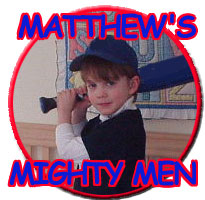 Ken Griffey Jr. joins three other former
Vancouver center fielders currently on Stanhope's
roster: Bernie Williams (1996), Johnny
Damon (1997) and Darrin Erstad (2000). All
four made their debut with Vancouver before making
their way to the friendly confines of Stanhope
Stadium. Honorable mention goes to Marquis
Grissom, traded from the Iron Fist to the Mighty
Men (then the Jerusalem Rabbis) in 1996.
Ken Griffey Jr. joins three other former
Vancouver center fielders currently on Stanhope's
roster: Bernie Williams (1996), Johnny
Damon (1997) and Darrin Erstad (2000). All
four made their debut with Vancouver before making
their way to the friendly confines of Stanhope
Stadium. Honorable mention goes to Marquis
Grissom, traded from the Iron Fist to the Mighty
Men (then the Jerusalem Rabbis) in 1996.
Vancouver GM Yaro Zajac said it "was time to head in another direction." The team, off to their worst start in franchise history, is six games under .500 and 24 games behind their arch-rivals, the Arkansas Golden Falcons.
Griffey was dealt to the Mighty Men on May 22 in exchange for outfielder Moises Alou and catcher Shawn Wooten. The two teams also exchanged draft picks, with Stanhope giving up a 9th and getting back a 5th, in the deal.
Griffey, a six-time All-Star, was selected by the Iron Fist with the 36th pick of the inaugural DMBL draft. He said he briefly considered retiring rather than reporting to Stanhope, but changed his mind after meeting with GM David Landsman and manager Buck Showalter. "I'm going to make the most of this opportunity and show the fans, the players and especially Yaro that I'm still one of the best players in baseball," he said.
The trade, after weeks of negotiations, wasn't supposed to be made public until after the All-Star Game. But longtime batting coach and former teammate Mike Greenwell told Griffey of the trade during batting practice on Friday night.
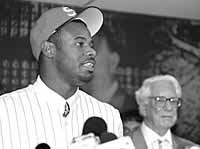 "I owed it to Junior," Greenwell said. "I didn't want
him to go out there thinking it was just another
game."
"I owed it to Junior," Greenwell said. "I didn't want
him to go out there thinking it was just another
game."
Griffey responded by rekindling memories of his glory days with the Iron Fist, going 4-for-5 with 2 HRs and 4 RBIs.
"He's the greatest player to have never won the Mitch," said long-time teammate Andy Van Slyke, now a broadcaster with the team.
Griffey had eight 100+ RBIs seasons, topped 200 hits five times, 40+ doubles three times and hit .300 four times. His "career year" was 1994, when he posted highs in almost every offensive category, set DMBL playoff records for most RBIs in a game (6) and most RBIs (9) and most HRs (4) in a series, and led the Iron Fist to their third World Series championship in four years. But with a strike casting the 1995 season in doubt, Griffey retired from baseball -- at age 24 -- to pursue an acting career. He appeared in Little Big League, Arli$$ and Summer Catch, and was hailed by critics for his compelling performance in "A Raisin in the Sun" on the London stage.
But baseball was in Griffey's blood. He returned to the Iron Fist in 1997 for another spectacular season, setting career highs in home runs, runs scored and stolen bases. Over the next four seasons he would play in 649 consecutive games and in three All-Star games, averaging 115 runs, 47 home runs, 135 RBIs and a .285 batting average each season. But when he was benched on Opening Day, 2001, Griffey said he knew his days in Vancouver were numbered. "All of a sudden, it was 'what have you done for me lately,'" he said.
Griffey, once the league's iron man, found himself cast as a part-timer, limiting his at-bats to platooning and as a defensive replacement. He was off to his best start in several seasons this year, however, hitting .304 with a .903 OPS, 11 doubles, 14 HRs and 38 RBIs in 69 games.
He leaves the Iron Fist as the franchise's all-time leader in at-bats (5,680), hits (1,688), RBIs (1,185) and home runs (353), and holds the team's single-season record for RBIs (204 in 1996).
But his career isn't over yet.
"I'm 31 years old," Griffey said. "I'm going to be in this league for a long, long time to come, and when I retire I hope it will be with a lot of Stanhope team records as well. And when it comes to deciding which cap I'll wear into the Hall of Fame, well, we'll see when I get there."
So Who Goes to Vancouver?
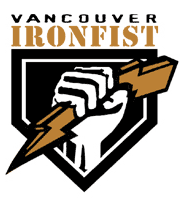 You may have known that Moises Alou was
included in the Griffey trade, but Did You Know
that Alou was once traded three times in one
season -- all before Opening Day? And Did You
Know that Griffey could be the second
future DMBL Hall of Famer dealt for Alou?
You may have known that Moises Alou was
included in the Griffey trade, but Did You Know
that Alou was once traded three times in one
season -- all before Opening Day? And Did You
Know that Griffey could be the second
future DMBL Hall of Famer dealt for Alou?
Alou broke in with the Louisiana Lightning (then known as the Scranton Sparrows) in 1993, hitting .244 in 22 games. He spent the next three years bouncing between Triple-A and the majors, finally sticking with the Lightning for good after hitting .386 with a 1.105 OPS in 223 at-bats in 1997. He became a regular the following year, hitting .284 with 32 HRs, 117 runs and 94 RBIs.
On Jan. 21, 1999, Alou and a third-round draft pick were shipped to Philadelphia for Garret Anderson, Mickey Morandini and Carlos Perez. Three days later, the Eagle Wings pulled off a blockbuster deal, sending Alou, Scott Brosius, Will Clark, Scott Erickson and Mark Leiter to the New York Amazins for a first-round draft pick, Rusty Greer, Mo Vaughn and Omar Vizquel.
But Alou still hadn't found a home. On Feb. 20, the Amazins traded Alou, Brosius, Jose Lima and Graeme Lloyd to Mighty Men (then the Jerusalem Rabbis) in exchange for Raul Mondesi and... Mike Piazza.
Alou hit .279 with 32 HRs and 129 RBIs with Jerusalem in 1999, then missed the entire 2000 season after he injured his knee falling off a treadmill. After a gruelling eight-month rehab, Alou played in every game last season, hitting .317 with 207 hits, 34 doubles, 29 homers and 113 RBIs. This year, he was hitting .269 with 33 runs and 37 RBIs, but surprisingly little power -- just 7 doubles and 6 home runs in 308 ABs, a .351 slugging percentage.
Though Alou is the bigger star, 29-year-old rookie Shawn Wooten could have the bigger impact on Vancouver's hopes to repeat as Morris Division champions. With two catchers still on the Interstate (Ben Petrick hitting .191, Todd Hundley at .190), the Iron Fist desperately needed a backstop, and Wooten's quick bat and cannon arm have made him an early favorite for the Pat Listach Rookie of the Year Award.
Wooten was hitting .315 with 47 runs and 24 RBIs in 76 games for the Mighty Men, but beware: Just 10 of his 96 hits were for extra bases, despite his free-swinging style (4 walks, 57 Ks). He is one of the league's top defensive catchers, however; he hasn't made an error all season, and he ranks second in baserunner kills (basestealers are 19-for-31 against him, a .387 CS%). Opponents had been running wild on Petrick and Hundley, who had combined to nail just 6 basestealers in 40 attempts (.150 CS%).